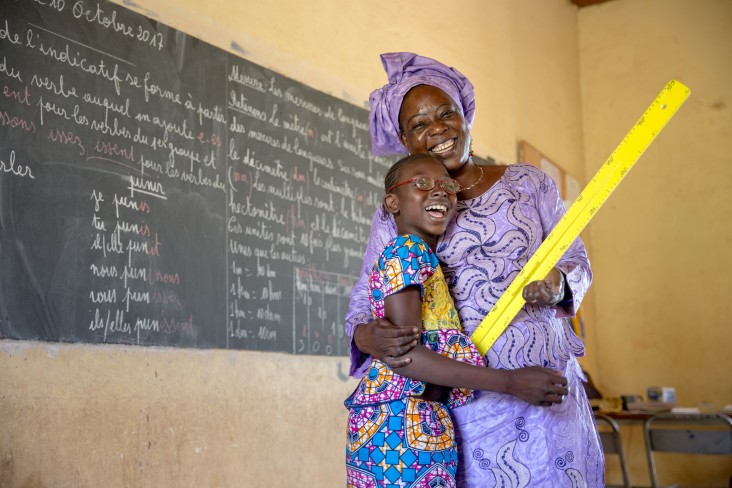Speeches Shim

February 2018—At 11 years old, Mafoune Dembele is a bright and confident sixth grader in Bamako, Mali. Because she suffers from a visual impairment, she used to stay late at school to finish her work because she was slow in writing, much slower than the other students.
For most of the children in Mafoune’s situation, the local school represents their only chance of receiving any education.
“We didn’t know that she had any low vision issues,” explains Amadou Dembele, Mafoune’s father. “One day, she came accompanied by her teacher, Mrs. Keita Kadiatou Doumbia, who detected the issue. Ever since it has been a good collaboration with Mrs. Keita.”
Mafoune is one of 252 children with low vision supported by a USAID project called Inclusive Education for Visually Impaired Primary School Children in Mali. The project, implemented by Sightsavers, aims to support the enrollment and retention of blind children and children with low vision in primary education in four regions of Mali—Segou, Koulikoro, Gao and the capital, Bamako.
“Through that project, children receive glasses and a reading stand," says Doumbia. “I write in large print and take into consideration the position where they are sitting in the classroom.”
Doumbia is responsible for identifying children with visual impairment. For her, inclusive education is important as it allows children with visual impairment to be integrated into school and beyond, in their social environment. It also fights against discrimination against disabled people. In Mali, it is estimated that more than 2,000 school-age children are blind and that 20,000 have moderate and severe visual impairments.
“It is important for visually impaired and [non-disabled] children to learn together in the same environment, working together and getting to know each other. It also helps reduce stigma among the parents,” says Doumbia.
The project, which runs from June 2017 to May 2019, trains teachers on inclusive education so they can help visually impaired students. It also establishes demonstration schools, which will serve as replicable models for the rest of Mali. Educational approaches will be tested and refined in a variety of settings (four mainstream schools, an integrated school, and two special schools).
Mafoune is now one of the top students in her class and her father is grateful for the support. “This is a good project. There are regular visits from the project workers, who are dedicated to their work. My daughter has now a good level at school,” he said.
“My favorite subject at school is history because I like to talk to my father about what I have learned,” says Mafoune.
LINKS
Follow @USAIDMali, on Facebook

Comment
Make a general inquiry or suggest an improvement.